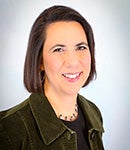When my corporate learning and development (L&D) department restructured, I lost my role in workplace education and needed to reassess my career path. With 5 years’ instructor experience, my background put me in demand for L&D roles in other companies, but I found I couldn’t express what I had done, or exactly what I wanted to do next. I continued to work for my company, but spent a year reflecting on my goals, and researching opportunities and the skills and abilities that would support my applications for new roles.

By reading instructional design blogs, change management articles, and government employment data, I determined a full master’s degree program (rather than self-teaching through books or enrolling in certification programs) was the correct choice for me. I sought academic rigor, feedback from classmates and professors, real-world problem-solving, and networking with other L&D professionals to fill the gaps in my knowledge and experience. I was prepared to invest considerable time, if my investment was efficient and effective.
Boise State’s Organizational Performance and Workplace Learning (OPWL) outshone the other master’s programs I found for its relevant coursework options and its powerful track record in project-based, high-touch instruction. I quickly found that OPWL attracts and retains amazing, supportive professors and staff. OPWL’s social and flexible online learning environment proved to be a better investment of my time than I ever imagined it would be. Since students around the world were choosing OPWL for similar reasons to my own, each semester we strengthened our global virtual teaming skills and peer collaboration abilities, adding value to real organizations with our team accomplishments.
It turned out that I wasn’t looking for just a workplace learning degree program. All unknowing, I had some human performance roots in my work experience, and with OPWL I was finally able to describe the problem-solving work I had done, and the organizational performance work that I wanted to do. Perhaps most important of all, OPWL taught me design skills, and showed me how I could be systematic in my practice while still honoring the complexity of human and societal interactions in the workplace (systemic practice).
OPWL helped me meet all my pre-program goals. To help me connect my reinvented self to the new roles I was looking for, OPWL also directed me to networking resources I hadn’t taken seriously before, and encouraged me in making the most of them. I am emerging from OPWL not only with a master’s degree, but prepared to deliver valuable results as a member of a respected community of practice that I will gladly support—and be strengthened by—the rest of my career.
Publications and Presentations
Swanson, I. , Shamsy, J., Roberts, K. , & Chyung, S. Y. (2019, April). Bring me data! Evidence-based survey design. Presented at ISPI’s Performance Improvement Conference, New Orleans, LA.
Chyung, Y., Swanson, I, Roberts, K., Goff, K., Kennedy, K., Dombrowski, R., & Johnson, S. (2018, June 9). OPWL post-conference chat webinar. Virtual presentation via Zoom.
Chyung, S. Y.+, Swanson, I., Roberts, K., & Kennedy, M. (2018, April 8). Evidence-based survey design with Likert scales. Presented at ISPI’s Performance Improvement Conference, Seattle, WA.
Chyung, S. Y., Swanson, I., Roberts, K., & Hankinson, A. (2018). Evidence-based survey design: The use of continuous rating scales in surveys. Performance Improvement Journal, 57(5), 38-48.
Chyung, S. Y., Swanson, I., & Shamsy, J. (2017, August 30). Write a strong survey instrument using evidence-based practices. Presented at ISPI-BABS Chapter meeting.
Denton, C., Eisele, A., & Swanson, I (2016, May). Case study: Steering “ECxplorers” toward STEM higher education and careers. PerformanceXpress Newsletter, May ’16 issue.
Award
Outstanding Graduate 2016